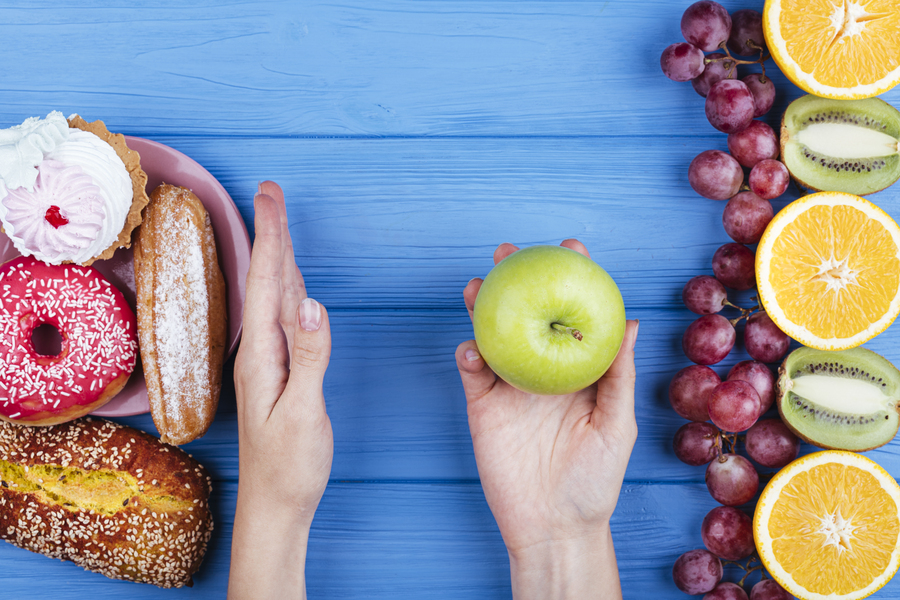Sugar is undeniably tasty and offers a quick energy boost. However, with increasing awareness about nutrition, many individuals are scrutinizing their sugar intake.
While various diets advocate for reducing sugar and carbohydrates, it’s essential to differentiate between different types of sugars. Natural sugars are found in foods like fruits which is called fructose and in dairy products called lactose. On the other hand, extra sugars are added into foods during processing or preparation, such as adding honey to cereal.
In the United States, many people exceed the recommended daily limit by consuming roughly 15-18 teaspoons of added sugar. This excessive intake results in health issues like type 2 diabetes, heart disease, and tooth decay. However, this doesn’t imply complete avoidance of sugar. Rather, it emphasizes the importance of being mindful of your sugar intake and identifying foods that may contain hidden sugars.
How Much Sugar Should You Eat In a Day?
While there is no specific advise for the daily sugar consumption, but there are guidelines one should keep in mind while adding sugar in the diet plan.
On average, Americans obtain about 12-13% of their calorie intake from added sugars, which is beyond recommended limits per day. Researchers advise adults to restrict added sugars to 10% of their total caloric intake during a day. For instance, if your daily calorie consumption is 2,000 , this suggests limiting added sugar intake to 50 grams per day, which is nearly 12 teaspoons of sugar per day.
Alternatively, different studies proposes even stricter guidelines, it suggests to reduce the daily intake of sugar to 6% only, which is approximately 6-9 teaspoons or 30 grams of sugar for a 2,000-calorie diet.
Further children have lower recommended limits. Infants under 2 years old should avoid added sugars entirely. But for the kids who are more than 2 years old and teenagers , the recommended daily intake is capped at 25 grams per day which is nearly 6 teaspoons.
Different Between Natural Sugar And Added Sugar
While your body typically metabolizes all sugar types similarly, there are a few exceptions to consider. Whole foods such as fruits, vegetables, legumes, and whole grains contain a mix of starches, including complex carbohydrates and fiber. On the other hand, table sugar and other sweeteners are classified as simple carbohydrates.
Complex carbohydrates consist of different type of sugars , sometimes involving 3 different types of sugar , hence it provides additional nutrients like fiber. Such type of sugar get more time in digestion, preventing rapid spikes in blood glucose levels.
Moreover, the digestion of fiber in complex carbohydrates produces short-chain fatty acids (SCFAs), which can enhance gut health by promoting the growth of beneficial bacteria through fermentation in the colon.
In essence, when monitoring your sugar intake, it is advisable to pay particular attention to added sugars.
Negative Health Impacts of Excessive Sugar Consumption
While moderate consumption of sugar, particularly natural sources, is generally acceptable, but excessive use of it can lead to an array of health issues. Consuming excessive sugar often results in a surplus of calories, contributing to weight gain. Increased body fat levels are associated with various health conditions, including:
- High Blood Pressure or Hypertension
- Cancer
- Severe Pain that is chronic in nature.
- Cardiovascular disease
- Joints Diseases – Osteoarthritis
- Sleep Apena

Tooth Decay Caused by Sugar
Added sugars are a primary risk factor for the development of dental caries, tooth decay or cavities, in both children and adults.
Research indicates a direct correlation between higher intake of added sugars and increased incidence of dental caries,Limiting added sugars significantly reduces the risk of tooth decay and cavities.
Foods containing natural sugars, such as milk and fruit, may not present the same level of risk to dental health. This is attributed to the presence of other beneficial nutrients in these foods, including fiber, water, calcium, and antioxidants. However, dried fruit can potentially pose problems for teeth as it tends to adhere to them.
Cardiovascular Disease and Added Sugar
The Researcher maintains stringent guidelines regarding added sugar consumption due to its potential association with Heart disease (CVD) risk. However, the direct link between the two is not as definitive as commonly assumed.
Some reports suggest a significant association between added sugar intake and Heart disease risk (CVD), particularly concerning sugar sweetened beverages, others present mixed findings.
This difference in studies or reports exist because most studies are observational, relying on participant-reported data or historical records. As a result, establishing a causal relationship, such as added sugars directly causing CVD, becomes challenging. Further research is required to thoroughly explore this potential connection.
Sugar and Diabetes
While Type 2 diabetes is often associated with sugar and carbohydrates, managing sugar intake is crucial for individuals with diabetes to prevent spikes in blood glucose levels. However, the relationship between added sugars and diabetes risk is not simple when it comes to prevention.
Research on the link between added sugars and diabetes risk yields inconclusive results. Diabetes risk factors include genetics, sedentary lifestyle, and age over 45 years, with added sugar consumption not considered a primary risk factor.
The researchers advise limiting sugary drinks, which are associated with Type 2 diabetes, and opting for water instead. Additionally, they note that consuming added sugars along with solid fats and excess calories has been linked to Type 2 diabetes, suggesting that added sugars alone may not be the sole contributor to increased diabetes risk.
NAFLD – Non-Alcoholic Fatty Liver Disease
Non-Alcoholic Fatty Liver Disease (NAFLD) refers to the accumulation of excess fat in the liver and is a prevalent liver condition around the world.
Research indicates a potential link between high consumption of added fructose, commonly found in sugar-sweetened beverages, and increased risk of NAFLD. Studies, particularly focusing on sugar-sweetened beverages, have highlighted this association.
However, it’s important to note that these findings are primarily based on observational research, indicating a correlation rather than causation.
NAFLD risk factors extend beyond sugar intake and can include conditions like type 2 diabetes and genetic predispositions.
Food High in Sugar
Among the sources of added sugars, beverages rank as the primary contributor, that includes but not limited to Sports drinks, fruit drinks, soft drinks, sweetened coffee and tea. These beverages collectively contribute approximately half of the added sugars consumed.
Sweet snacks, desserts , candies, and other similar foods are readily recognized for their high sugar content, but some unexpected items also contain significant amounts of sugar like sandwiches ,cereals , and sweetened yogurt
Surprisingly, sandwiches are accountable for 6-7% of added sugar intake among Americans, often due to the sugar used as a preservative in bread or condiments.
Additionally, breakfast cereals, bars, and yogurt are common sources of added sugars in diets. For instance, a single serving of a popular vanilla Greek yogurt contains approx. 8-9 grams of added sugars.

Tips To Reduce Daily Sugar Consumption
Given that many people surpass recommended levels of added sugars, it’s important to find ways to reduce sugar intake. Begin by identifying the foods high in sugar and beverages that you frequently consume. Then, explore alternatives that allow you to enjoy your favorite items while reducing added sugar. Consider the following tips:
- Go for less or no sweetener in your coffee or tea.
- Choose beverages with lower sugar content such as low sugar dairy free alternatives ,unsweetened tea, water and milk.
- Add a variety of fiber-rich, protein-packed, and healthy fat-containing foods into your meals to curb cravings for sugary snacks.
- Snack on whole fruits, nuts, seeds, vegetables, and hummus instead of heavily processed, high-sugar options.
- Pick products without added sugars; opt for yogurts, nut butters, and seed butters that are free from added sugars.
- Select unsweetened products and so that you may sweeten them yourself with honey , fruit or another natural sweetener.
Final Words
Managing your daily sugar consumption by find difference between added sugars and natural sugars present in whole foods such as fruits and milk. Natural sugars offer essential fiber and nutrients and found in complex carbohydrates, . On the other hand, added sugars, often high in calories, are associated with specific health issues.
Work hard to keep your daily sugar intake within 10 percent of your total caloric intake. Assess your regular consumption of high-sugar foods and beverages and explore substitutions with lower sugar content.




